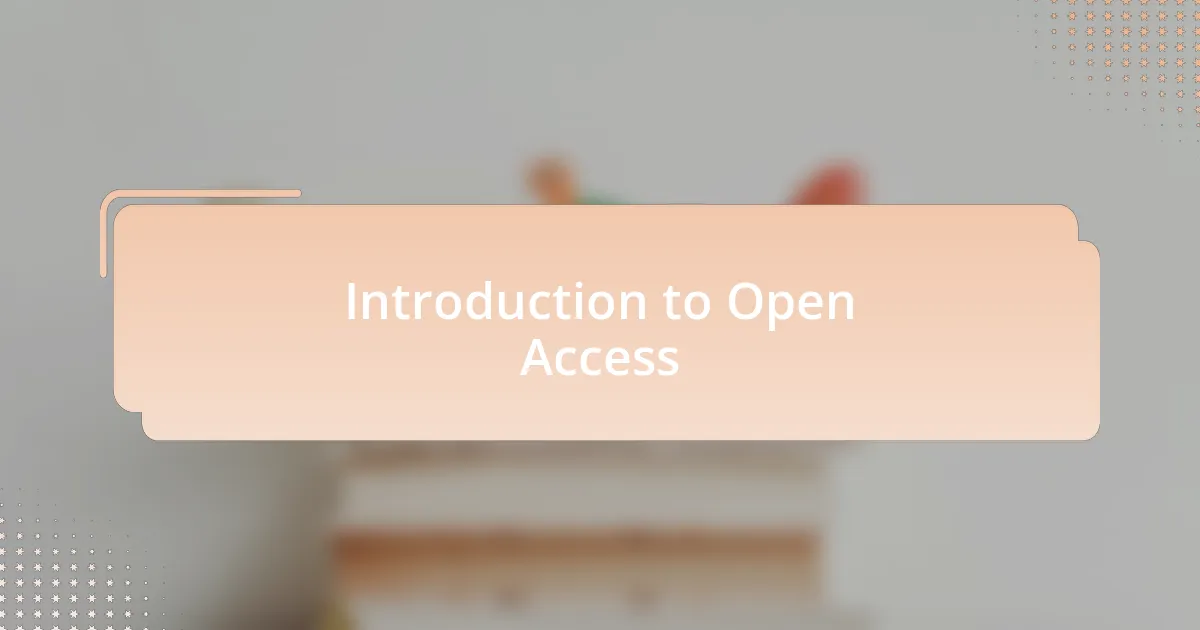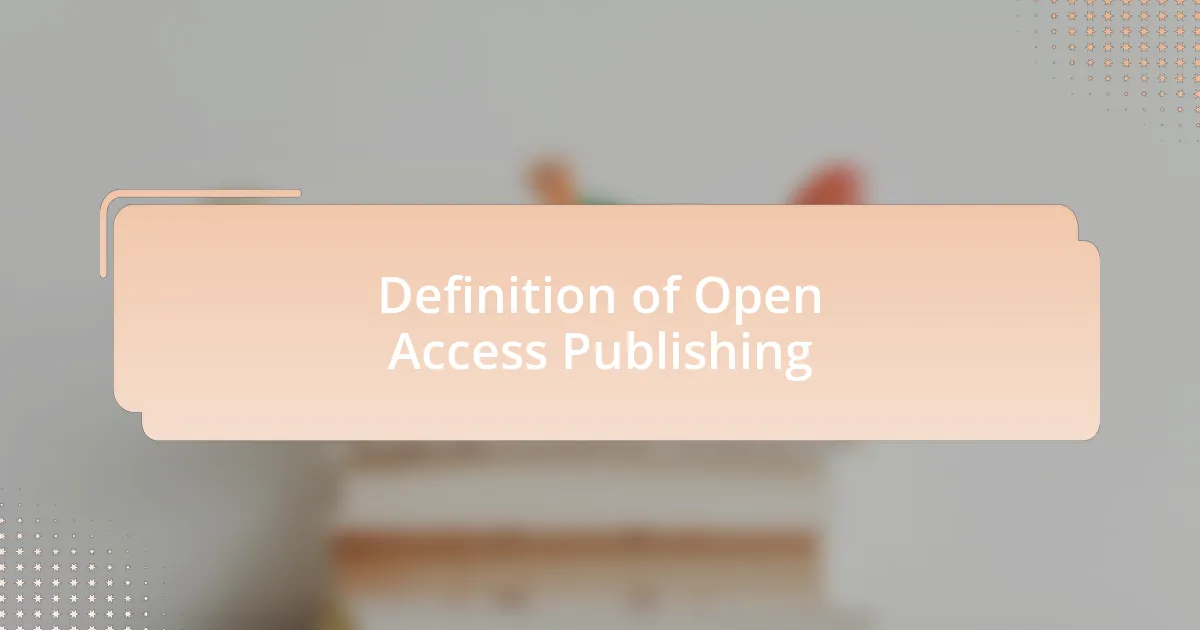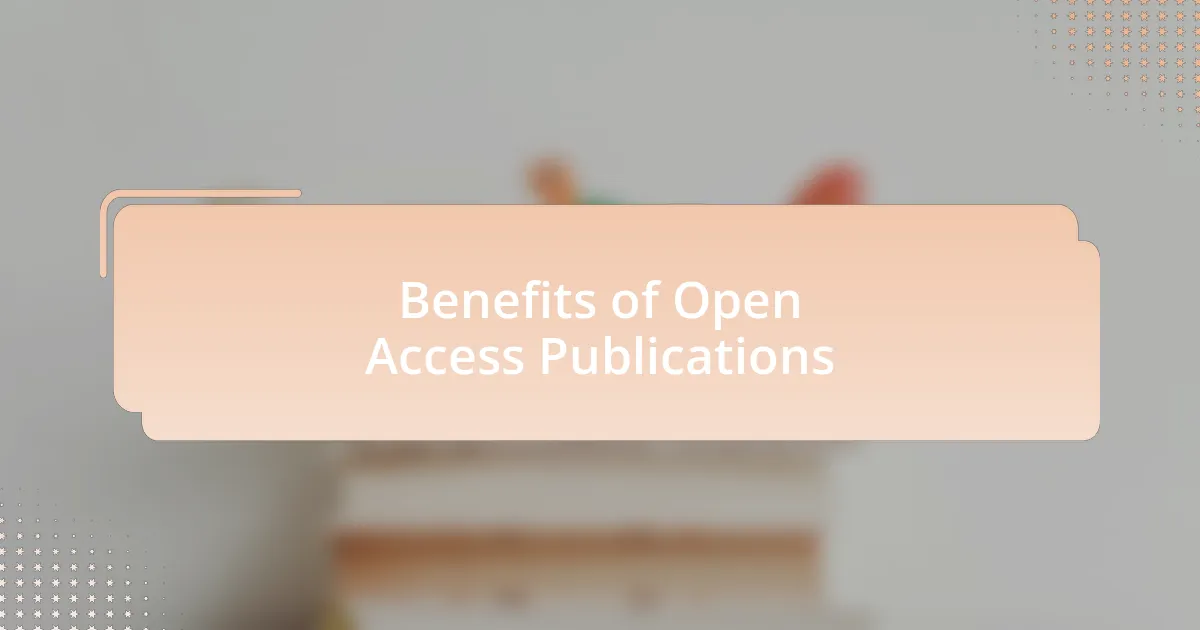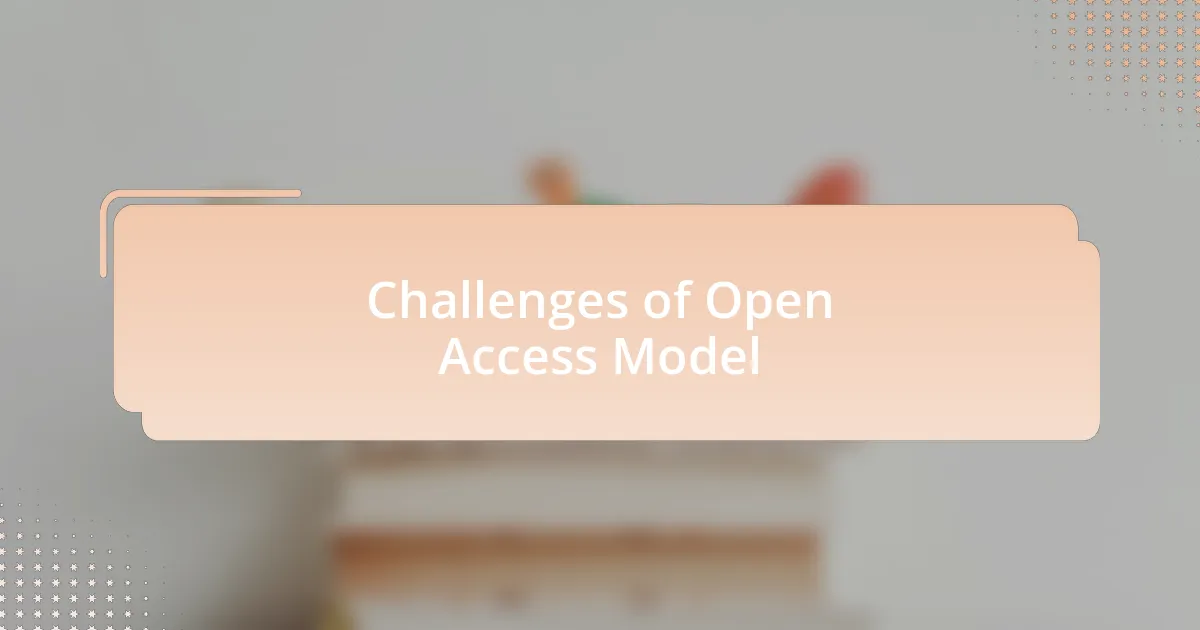Key takeaways:
- Open Access (OA) promotes unrestricted access to academic research, breaking down paywalls that hinder knowledge dissemination.
- It enhances visibility, collaboration, and innovation by allowing diverse audiences to engage with research findings.
- Challenges include financial burdens on authors, varying quality of publications, and concerns about the sustainability of the model.

Introduction to Open Access
Open Access (OA) is a transformative approach to scholarly publishing, allowing anyone to read research without financial barriers. I remember the first time I discovered OA; it felt like I had stumbled upon a hidden treasure trove of knowledge. I couldn’t help but wonder, why had it taken so long for research to become so accessible?
At its core, Open Access challenges traditional publishing models that often restrict access behind paywalls. I’ve seen researchers frustrated when their groundbreaking studies are locked away, limiting the impact of their work. Why should vital information be kept from those who could benefit from it the most?
The movement towards Open Access embodies the spirit of collaboration and democratization of knowledge. It’s exhilarating to think about how much innovation can flourish when everyone has access to the same information. Have you ever thought about the possibilities if more people could engage with scientific literature? The potential is genuinely inspiring.

Definition of Open Access Publishing
Open Access Publishing refers to the practice of making academic research freely available to the public, absent of paywalls or subscription fees. This means that anyone with internet access can read, download, and share research findings, which, in my view, is a significant step toward enhancing the dissemination of knowledge. I vividly recall attending a conference where a fellow researcher shared data from studies I’d never seen, simply because they were locked behind paywalls. It left me wondering how many other insights were being missed by scholars and the general public alike.
The essence of Open Access is rooted in the belief that knowledge should be a shared resource, not a commodity. I often think about the countless students who struggle to access research that could inform their studies simply because of financial constraints. When I was a graduate student, I faced this challenge myself. It felt unjust, as if the barriers to knowledge were stifling the very creativity that academic work aims to promote. Isn’t it time we rethink how we share our discoveries?
In essence, Open Access Publishing acts as a bridge, connecting researchers, practitioners, and the public through unrestricted access to academic content. The excitement I felt when I found a well-researched article available for free online is a sensation I believe every scholar should experience. Think about it: if every researcher and learner could share in the wealth of knowledge, what groundbreaking advancements might we achieve together?

Benefits of Open Access Publications
Open Access Publications offer several compelling benefits, chief among them increased visibility and reach. I remember publishing my first article in an open access journal and being amazed at the response. The engagement was immediate and widespread; it felt exhilarating to think that my work was being read not just by academics, but by anyone interested in the topic. This kind of accessibility can lead to greater impact, prompting further research and discussions across various fields.
Another significant advantage lies in enhancing collaboration among researchers. When work is openly accessible, scholars from different disciplines can connect and build upon each other’s findings more easily. I’ve seen firsthand how collaborations sparked by accessible research can lead to innovative solutions for complex problems. Isn’t it inspiring to think that a student in one country can contribute to a project based on a study they stumbled upon online, perhaps leading to breakthroughs that benefit us all?
Open access also democratizes knowledge, ensuring that quality research reaches underrepresented communities. I often think about the researchers in developing nations who might lack institutional resources but possess incredible insight and talent. By sharing their work freely, they can influence the global academic conversation and bring local issues to light. It hits home, doesn’t it, when we consider how knowledge equity can empower marginalized voices in the research landscape?

Challenges of Open Access Model
One of the key challenges of the open access model is the financial burden it can place on authors. While it’s fantastic that research can be freely available to all, many journals charge publication fees that can be prohibitively expensive. I’ve encountered this dilemma myself; facing a hefty fee after pouring my heart into a research project made me question if open access truly meant “accessible” for everyone.
Another concern arises around the quality and credibility of open access publications. Unfortunately, not all journals adhere to rigorous peer-review standards, leading to a mix of high-quality and questionable research being disseminated. I remember stumbling upon a paper that seemed to lack the academic rigor I expected, which gave me pause. How can researchers discern which journals to trust amidst this vast landscape?
Additionally, the sustainability of the open access model raises eyebrows. Funding for open access can be unpredictable, and many journals rely on institutional or government support, leading to concerns over long-term viability. Personally, I’ve seen how fluctuations in funding can threaten valuable resources. Isn’t it troubling to think that the very accessibility that opens doors could also hinge on uncertain financial foundations?